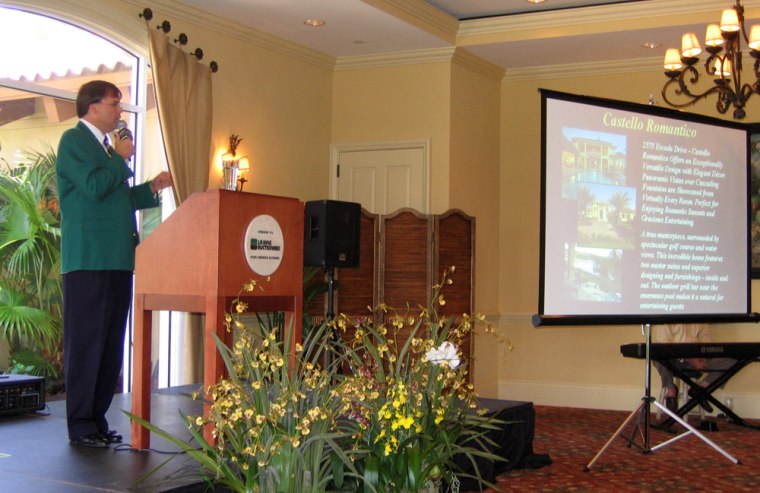Last year, software mogul John McAfee wanted to sell two of his properties in Hawaii and one in Texas, and he wanted to sell them fast.
So instead of hiring a real estate agent, he hired an auctioneer.
After three months of advertising, each property was sold on its respective auction day: one for $1.7 million, another at $2.2 million and the last for $3.1 million. No haggling. No contingencies. No waiting.
Selling a home via auction still conjures up images of desperate situations — perhaps bankruptcy, foreclosure or a death in the family drawing investors seeking to pick up a bargain property. But auctions increasingly are being used to sell high-end and even midrange homes as an alternative to the traditional listing and sales process.
Last year, sales through residential real estate auctions hit $14.2 billion, up 23 percent from $11.5 billion in 2003, according to National Auctioneers Association in Overland Park, Kans.
Auctions still make up a tiny percentage of the nation’s $1.8 trillion in annual home sales, but they’re no longer the marketing tool of last resort, said Walter Molony, spokesman for the National Association of Realtors in Chicago.
“There are more expensive homes on the market,” said Carl Carter, spokesman for J.P. King Auction Co., a Gadsden, Ala., company that specializes in high-end home auctions. “People are looking for a better way to call attention to their house.”
In McAfee's case, he did not want to wait months or even years for his homes to sell, as often happens with high-end real estate, which has a limited market.
“Sometimes you want to move on, and the quickest way is an auction,” said McAfee, the founder of anti-virus software firm McAfee Inc.
In the past five years, auctions have spread to midpriced homes as well, said Steve Baska, spokesman for the auctioneers association. Credit baby boomers inheriting more property, a cooling real estate market and society’s the desire for instant gratification. “It’s the fastest-growing niche of all types of auctions,” Baska said.
Residential auctions are bustling at Wilson Auctioneers Inc. in Hot Springs, Ark., which doubled its residential real estate auction revenues to $19.5 million last year. Most of the auctioned homes are priced between $350,000 and $400,000, said Joe Wilson, the firm’s owner.
“The traditional listing stays on the market for six to eight months,” Wilson said. “Our sellers see an opportunity to sell a house in 30 days with no contingencies.”
Indeed, auctions are a good fit for sellers who need to cash out fast, perhaps by a certain date, or who don’t want to carry the cost of mortgage payments while a property sits on the market. Real estate agents may also recommend auctions for unusual properties, where it can be hard to find comparable prices.
Advertising prior to an auction typically lasts 30 days to three months. The auctions, which are often held inside the house or in a hotel ballroom and simultaneously online, last just minutes or even seconds.
The upside: Homeowners get to sell a house “as-is,” with no negotiations or renovations.
But owners should be flexible on price, because what they may get in convenience, they may give up in control. With no negotiations, buyers ultimately decide the price paid.
An owner can set a minimum price, but that often limits the number of bidders who attend the auction, said Baska. Real estate auctions typically bring anywhere from just a few interested buyers to several hundred.
The total cost to sellers, including marketing fees and a commission, tend to be comparable to fees paid to traditional agents. Sellers sometimes pay cash up front for marketing, ranging from a couple thousand dollars to hundreds of thousands.
Some owners negotiate those fees. Mark Bratton of Hot Springs, Ark., got a reduced rate for auctioning off $100,000 worth of personal belongings as well as his $275,000 home. Several hundred people showed up to the auction, and Bratton got $25,000 more for his property than he expected. He also wound up paying less than he would to a traditional agent.
“It was easy and convenient,” said Bratton. “If we sell another house, absolutely it will be auctioned.”
